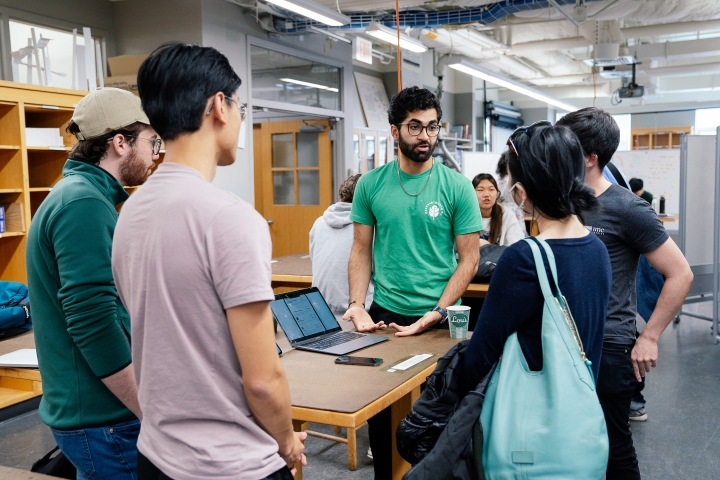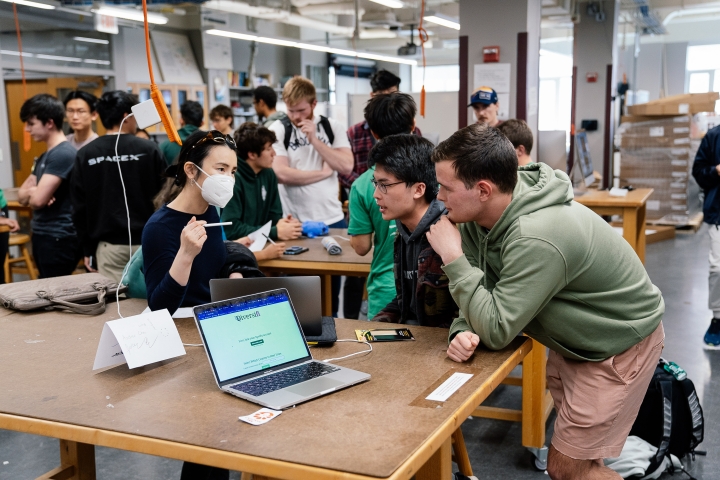The seventh edition of HackDartmouth, an annual coding competition, was held at the MacLean Engineering Sciences Center this past weekend. Around 80 students gathered to brainstorm ideas and create innovative technology solutions that address issues in a variety of sectors—health care, climate, education and more.
The 24-hour event, themed “Hack on your wild side,” had five categories for participating programmers to choose from: health and recovery, empowerment, augmented reality/virtual reality, cultural revitalization and clean tech.
“This is the first in-person hackathon we’ve had in three years,” says Katherine Lasonde ’23, director of HackDartmouth, a student-led program. The event was cancelled in 2020 and held virtually last year owing to COVID-19 concerns. The contest usually welcomes participants across the country, but, out of an abundance of caution, was limited to Dartmouth students this year.
Prizes, worth more than $10,000 in all, ranged from smart speakers and tablets to swag boxes from sponsors.
The health and recovery stream was the most competitive category, says Lasonde. “A lot of people ended up gravitating towards mental wellness because it’s such a pertinent issue at this current time, especially among college students,” she says.
This was evidenced in the entries that placed first and second in this category. Sadbird, created by Matthew Timofeev ’25, Eric Lu ’25, Aneesh Patnaik ’25, and Rishav Chakravarty ’25, flags negative and emotionally confusing tweets that users can choose to avoid. Elizabeth Frey ’24, Russell Chai ’24, and Annie Qiu ’24 designed WellBuddies, a digital buddy that provides customized suggestions to encourage students to prioritize their well-being.
Ziray Hao ’22, Vivek Hazari ’22, Daniel DiPietro ’22, and John McCambridge ’22 bagged the prize in clean tech for Canary, a mobile app that promotes socially responsible investing by assessing the carbon footprint of a user’s investment portfolio.
Plant Buddy and Greenlight were awarded first and second place in the empowerment category. The former, developed by Sherry Liu ’22, Ashna Kumar ’24, Madeleine Bernardeau ’22, and Chavin Udomwongsa ’24, helps users care for their plants better. The latter, made by Steven Mendley ’24, Jackson Desmond ’24, Tucker Simpson ’24, and Michael Mauricio ’24 is an app for Apple iPhones that manages entry of guests into Greek spaces on campus.
The prize-winning entry in the AR/VR category was RemembVR, a virtual reality experience that builds nostalgic timelines for users from their photos and audio playlists. It was built by Julian Wu ’22, Brandy Zhang ’22, and Macy Toppan ’22.
Benedict Tedjokusumo ’23 created Why We Eat, an app that provides customized local dining options. The app won second prize in the cultural revitalization category. The top winner in that category was Diversifi, a web app built by Ravin Anderson ’24, Julian George ’24, Andrew Chen ’24, and Alphonso Bradham ’24, that introduces users to new music from other cultures, using playlists to gauge their musical tastes.
Many participants did not have a background in computer science, Lasonde notes. She hopes to see a bigger turnout at next year’s event, tentatively scheduled on April 15-16, 2023.


